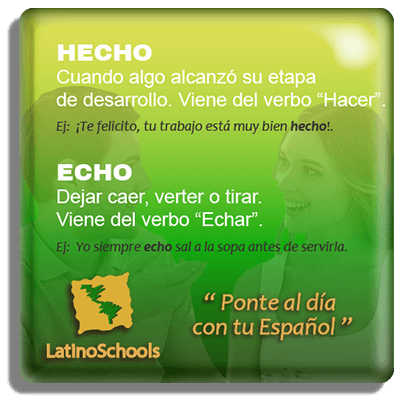Menu
Hecho y Echo
(Done and Pour)

Hecho
(Del verbo “hacer”)
Cuando algo alcanzó su etapa de desarrollo.
Ej.: ¡Te felicito, tu trabajo está muy bien hecho!
Echo
(Del verbo “hacer”)
Dejar caer, verter o tirar.
Ej.: Yo siempre echo sal a la sopa antes de servirla.
Done
(From the verb to do)
When something reaches its development stage.
Ex.: Congratulations, your work is very well done!
Pour
(From the verb to pour)
Drop, pour or throw.
Ex.: I always pour salt into the soup before I serve it.
Many students of the Spanish language have to face a big obstacle when they study this language, which is learning the difference between ‘Echo’ and ‘Hecho’, two words which sound the same but are written differently and have different meanings. These two words, in other words, are homophones.
Moreover, in this case, it is really important to acknowledge that the Spanish word ‘Echo’ can lead English speakers to misunderstand the meaning of the word as it is a ‘false friend’. While the translation from English to Spanish of the word is ‘eco’, the Spanish word ‘echo’ refers to the third person singular of the present indicative of the verb ‘echar’ (to pour). Furthermore, in Spanish, it can also be confused with the word ‘hecho’ (‘done’), past participle of the verb ‘hacer’ (to do).
As we have already mentioned in past Spanish pills, in Spanish there is a letter of the alphabet, the ‘hache’ (‘H’, ‘h’) which is not identified with any sound even if it is written. This lack of sound is the cause of many orthographic mistakes in Spanish because when it is missing it entirely changes the meaning of the words.
For example, while the word ‘echo’ might refer to the act of getting rid of something, throwing it or letting it fall, the word ‘hecho’ means that something has reached its full development, or that it is over or finished so to speak.
A very useful tip for you to remember when the ‘H’ is needed is to consider if the context where we are going to use the word implies that we are going to get rid of something, throw it or expel it. In these cases, just like the with verb ‘echar’ (to throw), we throw the ‘H’ away. However, on the contrary, if we refer to something that has been built or completed, then we must write the ‘H’ so that the word is complete.
Do you still not understand the difference completely? Don’t worry! Now we will give you some exemplary sentences so that you perfectly master the use of ‘Echo’ and ‘Hecho’. Take notes!
Los niños dejaron hecho su cuarto antes de ir al colegio.
The children had their room done before they went to school.
¿Echo esto a la basura o prefieres conservarlo?
Do I pour this in the trash or do you want to keep it?
¿Has hecho lo que acordamos?
Did you do what we agreed?
Si echo más sal a la comida me puede quedar salada.
If I pour more salt into my food, it can make it salty.
Ya está hecho el asado.
The roast is done.
A ver si mañana echo la carta al buzón.
I’ll see if I can pour the letter into the mailbox tomorrow.
El hecho ocurrió a las 5 de la tarde.
The incident happened at 5:00 p.m.
Tienes suerte si no te echo de aquí ahora mismo.
You’re lucky if I don’t kick you out of here right now.







